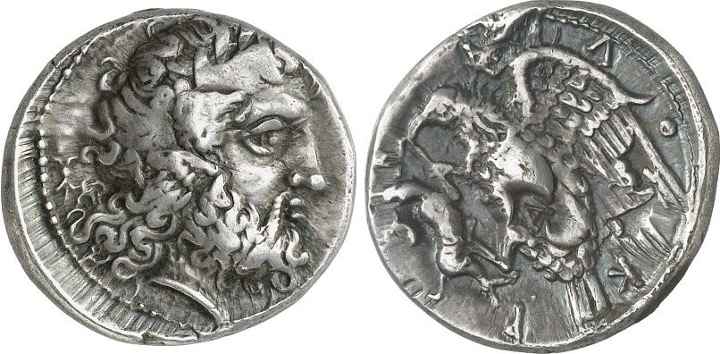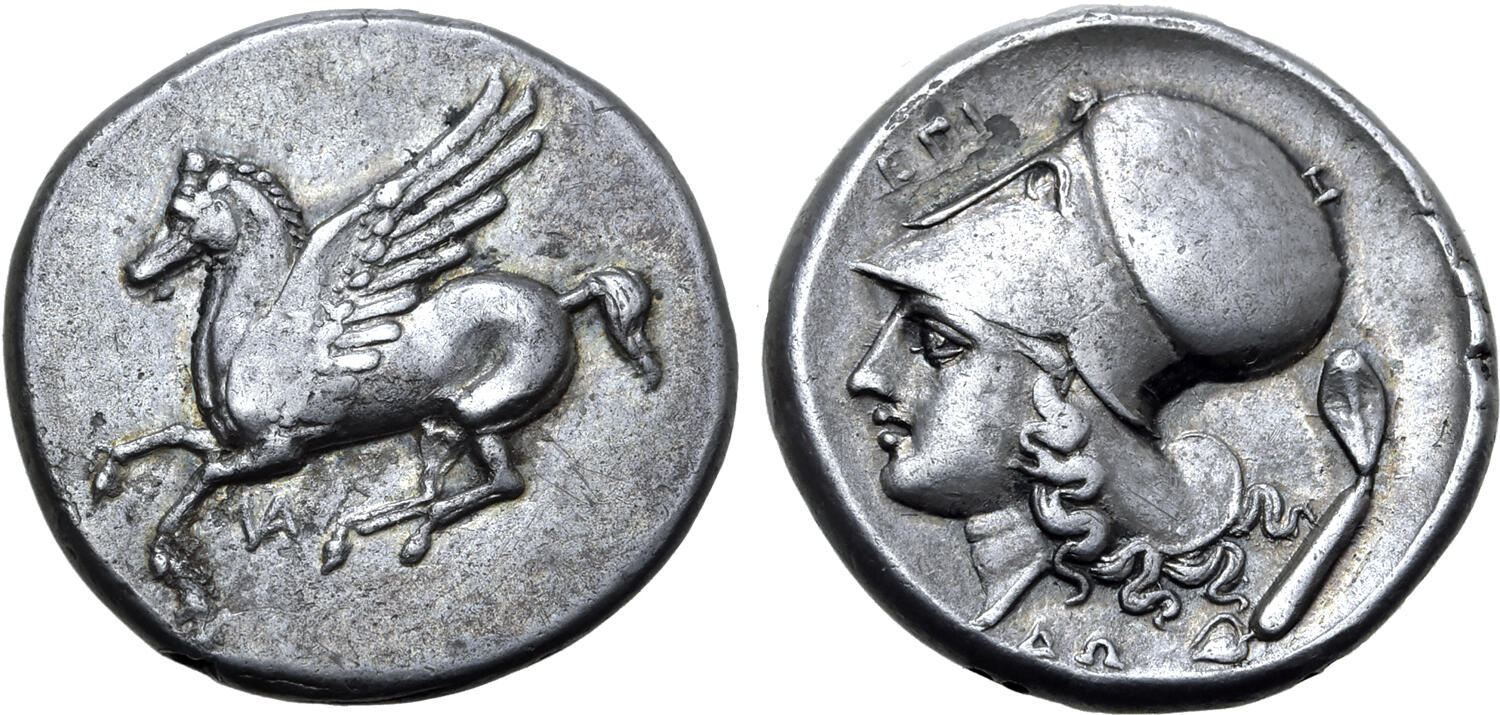1993 - Locri Epizephyrii (Nomos Zeus/eagle) over Corinthian type (Pegasus/Athena) (Auctiones, 29, June 2003, 497): Difference between revisions
From SILVER
No edit summary |
No edit summary |
||
| Line 18: | Line 18: | ||
|Denomination=nomos | |Denomination=nomos | ||
|Standard=Achaian | |Standard=Achaian | ||
|Coin series reference=SNG ANS 3 Bruttium | |Coin series reference=SNG ANS 3 Bruttium-Sicily, n° 519; HN Italy, n° 2319-2328; HGC 1, n° 1565 | ||
|Coin series web reference=https://greekcoinage.org/iris/id/locri_epizephyrii.hn_italy.2319-2323 | |Coin series web reference=https://greekcoinage.org/iris/id/locri_epizephyrii.hn_italy.2319-2323 | ||
|Overstruck obverse description=Pegasus (visible on obverse: traces of pegasos' body) | |Overstruck obverse description=Pegasus (visible on obverse: traces of pegasos' body) | ||
Latest revision as of 07:10, 31 December 2023
399 BCE - 300 BCE | ΛΟΚΡΩΝ
Images
Overstriking coin

SO 1408 - Locri Epizephyrii over uncertain mint.jpg [1]
Location/history
| Sale(s)Sale(s) ᵖ: | Auctiones, 29, 2 June 2003, 497 = Gorny & Mosch, 200, 10 Oct. 2011, 1164 = Roma Numismatics, EA, 29 Aug. 2015 | |
| Private collection(s)Private collection(s) ᵖ: | F. James Collection |
Overstriking coin
Description
| ObverseInscription or printing placed on the obverse.: | Head of Zeus right, wearing laurel wreath. In left field, thunderbolt. Border of dots. | ReverseInscription or printing placed on the reverse.: | ΛΟΚΡΩΝ (Greek) Eagle flying left, dead hare in talons. Border of dots. |
Mint and issuing power
| MintIdentifies the place of manufacture or issue of a numismatic object.: | Locri Epizephyrii | Ancient regionAncient region. | Bruttium | Modern countryModern country: Italy | AuthorityIdentifies the issuing power. The authority can be "pretended" when the name or the portrait of X is on the coin but he/she was not the issuing power. It can also be "uncertain" when there is no mention of X on the coin but he/she was the issuing power according to the historical sources: |
Chronology
| FromIdentifies the initial date in a range assigned in a numismatic context. 399 BCE toIdentifies the final date in a range assigned in a numismatic context.. 300 BCE | Classical 480-323 BC |
Physical description
| MetalThe physical material (usually metal) from which an object is made.: Silver |
WeightWeight of the numismatic object (in grams). in grams: 7.667.66 g <br />7,660 mg <br /> | DenominationTerm indicating the value of a numismatic object. Examples: tetradrachm, chalkous, denarius.: nomos | |
| StandardStandard.: Achaian | |||
References
| Coin referenceReference of the Coin: | Coin series referenceReference to coin series study: | SNG ANS 3 Bruttium-Sicily1SNG ANS 3 Bruttium-Sicily, n° 519, HN Italy2HN Italy, n° 2319-2328, HGC 13HGC 1, n° 1565 | |
| Coin series web referenceCoin series web references: | |||
Overstruck type
Description
| ObverseInscription or printing placed on the obverse.: | Pegasus (visible on obverse: traces of pegasos' body) | ReverseInscription or printing placed on the reverse.: | Head of Athena (visible on reverse: tail and some of back of helmet, A behind, and neck termination) |
Mint and issuing power
| MintIdentifies the place of manufacture or issue of a numismatic object. ᵖ: | Corinth | Ancient regionAncient region. ᵖ | Peloponnesus | Modern countryModern country: Greece | AuthorityIdentifies the authority in whose name (explicitly or implicitly) a numismatic object was issued. ᵖ: |
Chronology
| FromIdentifies the initial date in a range assigned in a numismatic context. 410 BCE toIdentifies the final date in a range assigned in a numismatic context.. 350 BCE | Classical 480-323 BC |
Physical description
| DenominationTerm indicating the value of a numismatic object. Examples: tetradrachm, chalkous, denarius. ᵖ: | stater |
References
| Coin type referenceReference to coin series study ᵖ: | Calciati 19904Calciati 1990 | ||
| Coin series web reference overstruckCoin series web references overstruck: | |||
Additional data
| Frequency of overstrikesFrequency of overstrikes: | rare and concentrated | Level of confidenceLevel of confidence of the identification: | sure |
| RemarksRemarks: | Struck over Corinthian type Obverse: Traces of pegasos' body visible on head of Zeus. Reverse: Tail and some of back of helmet, A behind, and neck termination visible on body of eagle on reverse (identification: David MacDonald) | ||
References
- ^ Troxell, Hyla A. (1975), Sylloge Nummorum Graecorum ANS 3. The Collection of the American Numismatic Society. Sicily 3 (Bruttium-Sicily I: Abacaenum-Eryx), New-York, pl. 38.
- ^ Rutter N. Keith et alii (eds.) (2001), Historia Numorum Italy, London, xvi, 223 p., 43 pl.
- ^ Hoover, Oliver D. (2018), The Handbook of Greek Coinage Series, Volume 1. Handbook of Coins of Italy and Magna Graecia, Sixth to First Centuries BC., Lancaster-London, 2018, lxi, 527 pages, 23 cm
- ^ Calciati, Romolo (1990), Pegasi, Mortara, Edizioni I.P..
